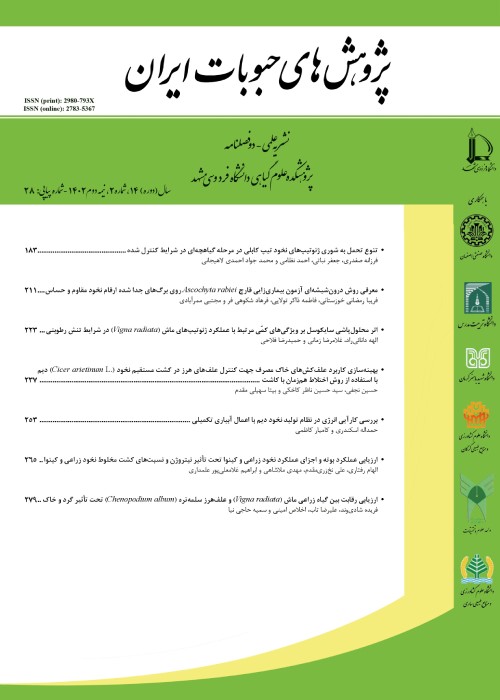Potential Optimization of Soil-Applied Herbicides in Rainfed Chickpea (Cicer arietinum L.) through Incorporation via the Sowing System
Weeds are one of the most problematic factors in chickpea production systems and chemical control of weeds is limited in Iran because of registered selective herbicides for this crop are not available for farmers. In this situation, optimizing of herbicide application (especially soil-applied herbicides) is one way that can help farmers to combat with weeds. Incorporated By Sowing (IBS) is one of the best way for optimizing of non-selective soil herbicides application in crops. The purpose of this experiment is to investigate the possibility application of non-selective soil-applied herbicides in directed planting of chickpea via IBS.
Application possibility of non-selective herbicides in directed sowing of chickpea was evaluated in Ardabil and Zanjan in 2020. The treatments were arranged in a strip plot experiment with randomized complete block design and 3 replications. The vertical factor was herbicide application (including: trifluralin, metribuzin, pendimethalin, imazethapyr, and their combination with (phenmedipham+desmedipham+ethofumesate), and also oxyfluorfen and weedy and weed free controls. Horizontal factor was incorporated by sowing (IBS) methods (including: incorporate by seed planter and cultivator+seed planter). Seed germination of chickpea, weed density and biomass and chickpea grain yield were evaluated 30 days after herbicide application and in the end of chickpea growth.
IBS methods did not have a significant impact on weed and chickpea density and biomass. Therefore, the use of a cultivator before seed planting is only recommended when the seedbed is inadequately prepared or if pre-planting weed control has not been effectively executed. In contrast, herbicides had significant effects on weeds population and chickpea in experimental locations. In Ardabil, pendimetalin and pendimetalin + (phenmedipham + desmedipham + ethofumesate) were the only treatments that had low efficacy on weeds (with 48.9 and 51.7 % weed biomass reduction respectively) and other treatments had no significant difference in 30 days after herbicides application. In the end of growing season, the highest weeds biomass reduction (in compared with control) were recorded in trifluralin, metribuzin and imazethapyr in combination with (phenmedipham + desmedipham + ethofumesate) and oxyfluorfen (with 84, 83, 80 and 70 of control (%) respectively). In Zanjan, single application of trifluralin and metribuzin and their combination with (phenmedipham + desmedipham + ethofumesate) and combination of imazethapyr with (phenmedipham + desmedipham + ethofumesate) had the highest weed control with 79, 71, 78.6 and 75.5 % respectively. In contrast with Ardabil, the lowest weed control efficacy was recorded in oxyfluorfen plots (22.4%). Grain yield of chickpea was also high in trifluralin + (phenmedipham + desmedipham + ethofumesate) and was low in imazethapyr in Zanjan and Ardabil.
Application of soil herbicides (including: Metribuzin and Trifluralin) in chickpea is possible only if, farmers use them just before sowing and incorporate the herbicides into the seedbed during the sowing process.
- حق عضویت دریافتی صرف حمایت از نشریات عضو و نگهداری، تکمیل و توسعه مگیران میشود.
- پرداخت حق اشتراک و دانلود مقالات اجازه بازنشر آن در سایر رسانههای چاپی و دیجیتال را به کاربر نمیدهد.


